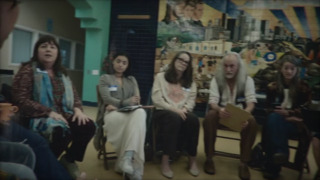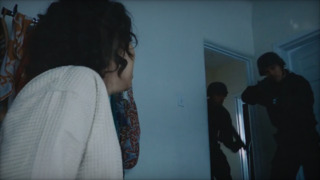Note: The following article contains major spoilers for Telling Lies and Silent Hill: Shattered Memories and minor spoilers for Her Story. This article briefly references suicide. If you are struggling with suicidal thoughts, contact a suicide prevention organisation near you. For those in the US, you can reach the Suicide Prevention Lifeline at 1-800-273-8255 or find them online at suicidepreventionlifeline.org. If you are in the UK, you can call The Samaritans on 116123 or visit their website at www.samaritans.org.

In the same way that police might raid a home, ejecting clothes from all the drawers, overturning every piece of furniture, Her Story is a game about police ransacking a woman's history. Right or wrong, in their interrogation of Hannah Smith, they attempt to leave no aspect of her life unexamined, to allow no stone to go unturned. And you know what? It almost feels quaint. Extended, high-pressure grilling by law enforcement can be a stressful experience, even one that reinforces trauma. Still, Hannah, Her Story's protagonist, exercises her ability to lie, to evade, and eventually, to call for a lawyer. If she wanted, she could even give a no-comment interview.

We observe the game's world through a camera, the most reliable narrator many of us can imagine. However, most of the setting falls outside the frame of this surveillance medium, which allows this suspect to construct falsehoods for the police. The limitations of the fixed camera interview in this game represent an opacity real law enforcement has long wished to do away with. Sam Barlow's follow-up to Her Story, Telling Lies, at least partially depicts how the state has pushed those boundaries.
Developed by Drowning Mermaid and released in 2019, Telling Lies has us play Karen Douglas, an FBI agent leafing through a database of videos she swiped from the NSA. The videos detail the conversations of undercover FBI informant, David Smith, as he infiltrates a group of environmental activists. As Karen, we search our ill-begotten library with a privacy-conscious operating system called CastleOS. Castle operates much like the browser from Her Story. We can type a search term into it and receive back video clips which contain the phrase we typed in. By listening out for keywords in those videos and plugging them back into the database, we can grasp towards an understanding of the case.

The footage that we voyeuristically browse is filmed through spy cameras installed in the corners of unassuming apartments, a clapped-out old van, and a cosy houseboat. It's also ripped from online video chats in which the non-spy parties have no knowledge that they're being filmed. The surveillants do not consider any moment too private or too sacred to fall outside their purview. In fact, for David, the closer he can get, the better.
The operation David is working on is called Project Green Dagger, and the FBI is conducting it in the interests of the fossil fuel firm Prosperen. Prosperen has been building a controversial gas pipeline but fears retaliation from the activist group Green Storm, which has been known to vandalise the property of environmentally-destructive companies. Michael Campbell, David's handler at the FBI, calls them "American jihadists". To close the distance to Green Storm, the FBI gives David the pseudonymous surname Jones and pairs him with another informant, Simon MacMillan, to creep into an activist group distantly related to Green Storm.

The plan to tap into that secondary cell is for David to start a relationship with Ava Martin, a mixed-race nineteen-year-old in the group. The informant wins over her team with his rugged charisma, frustrated rejection of moderate protest methods, provision of his van for transport, and by outing Simon as a serial infiltrator of left-wing organisations. But David has left behind a family to take this job, straining his relationship with his wife, Emma, and daughter, Alba. To complicate matters, he falls in love with Ava and will eventually leave her pregnant with his baby.
David incessantly urges the other members of the organising group to adopt more extreme tactics. At a festival of activists, including members of Green Storm, he tries to recruit accomplices to a fake plot to blow up a bridge. This is the bridge that would deliver construction vehicles to the site of Prosperen's pipeline. To his disappointment, no one takes the bait. With his behaviour increasingly erratic and his agitation bearing no fruit, the FBI pulls David from the operation, leaving Ava with a partner who suddenly disappeared and a newborn baby to raise alone. They also send armed police to raid Ava's apartment.

When he wasn't wooing one of his targets and trying to coax activists into property destruction, David used camgirl Maxine Williams as a living diary. He eventually got too pushy in his conversations with Max, prompting her to reveal that she records all of her sessions. She threatens to expose him, and David counters by scaring Max with the legal repercussions of blackmailing an FBI agent. This clash comes to a head when Smith shows up at Max's apartment with a gun and demands she deletes the evidence. Max, one step ahead, manages to shoot him in the leg and have him arrested. When David's fraternisation with a sex worker reaches the public's attention, he loses Emma, who also begins keeping Alba at arm's length from him. Having burned Ava, David also cannot see her again or meet his new daughter. Reflecting on the damage he's caused in this investigation, and throughout his life, David commits a suicide bombing on the Prosperen pipeline. It is one last attempt at a redemptive act: ironically performing the demolition he'd been assigned to prevent.
Telling Lies serves as a rebuttal to anyone who thinks all games are primarily defined by their mechanics. The mode of interaction in Telling Lies is the spitting image of Her Story's. However, it is narratively and visually divorced from Barlow's previous project. Her Story's shots are all taken far from its subject. They are static, washed out, and blurry with 90s VHS distortion. The game's cinematography and post-processing say that we are distant from the person we want to examine, that we have a limited perspective on her world, and that very little about her is clear. Telling Lies's visual aesthetics are the mirror opposite. Its colours are warm, its cameras are frequently carried through houses and driven around blocks by their operators, and we get right up in the faces of the subjects. Before we've even torn the wrapping off of Telling Lies, its cinematic styling says that this footage is far more intimate than what we saw last time around and that we will get the chance to see events from every angle.

In our panoptic view of Telling Lie's events, we see how real surveillance evolved between the era in Her Story (the mid-90s) and this new age (the 10s). If you read my article on Barlow's previous game, you'll remember me saying that if there were cameras in Hannah's home and her parents' attic and every other place the critical plot points hit, there'd be no ambiguity in its history. The investigator's knowledge would be total. In Telling Lies, there are recording devices in every one of its key locations, and that infiltration has just the repercussions we'd expect. The incursion of investigators into our phones, our tablets, and our laptops was ultimately them inserting themselves into every private space we have. It's an elegant solution to the problem of suspects lying or going quiet when interacting with your investigators: you just turn the machines they tell all their secrets to into the detectives.
Truth be told, concealing a camera in every bevel and nook means that Telling Lies is not nearly as engaging a mystery as Her Story was. There's an insufficient volume of unknown in which your imagination and deduction skills can run wild. With the ambiguities and misunderstandings that unknown would create gone, the game also can't cartwheel through as many perspective shifts as its predecessor. You're less often speculating about the narrative and more often listening to the confirmed version of events.

If there is one revelation during Telling Lies that rewired how I thought about the archive, it was David's death. The tragedy of David's suicide back propagates through his timeline to make the plot not just a story of a man building his tower of lies higher and more rickety with each day. It's the story of what led a person to lose it all and think he was better off dead than alive. It's a similar contextualisation to the one in Silent Hill: Shattered Memories, the horror on which Sam Barlow made his name. At the start of Shattered Memories, we see an image on a camcorder: the protagonist, Harry Mason, smiles during an impromptu photo opportunity with his daughter. However, the Harry we play is estranged from his family and spends the game futilely attempting to return to the image on the camera. At the end of Shattered Memories, it turns out that Harry is long gone; he is only a memory made real by the supernatural effects of Silent Hill.
Harry and David exist at the time of their games only in the tapes or on the hard drives that captured their lives. Barlow suggests that the surveillance of us gives us a haunting immortality. That we could be talking, singing, or screaming on a government server or family camera long after we stop doing so in the physical world. That in an era where recording is so pervasive, our image may no longer be our own. And make no mistake, that capture of us is happening on a massive scale. Besides the ubiquitous use of CCTV in public spaces and corporate online surveillance, the NSA tracks the phone numbers involved in almost every call made in the US, and has the power to access the contents of phone conversations, emails, Facebook posts, instant messages, and internet histories of Americans. The UK's GCHQ has tapped the fibre optic cables that carry phone and internet traffic into and out of the UK, giving them a window on all the same classes of data the NSA has. The GCHQ shares its findings with its American counterpart.

Police forces routinely obtain warrants that allow them free reign over peoples' most private data. You may believe you're safe from the intrusion because you're not under investigation. Yet, US law enforcement can request citizen data in bulk if they are looking for a specific individual in the crowd. Amazon has also forwarded police footage from Ring doorbells without a warrant or the owners' permission. In the UK, the current version of the Investigatory Powers Bill, the brainchild of former Prime Minister Theresa May, makes it legal for police to hack into citizens' devices and view their browsing history.
That unrestricted surveillance is scary enough, but also consider that the information age has allowed authorities scarily efficient tools to access, sort, and collate that data. I wish that Telling Lies simulated that command over the products of surveillance because, as it is, it undersells the threat. The clunky, uncooperative interface of Her Story is appropriate to its era and institution. You're beating some sense into a well-worn database from 1994 kept by a single police department. Yet, Telling Lies features software from 2015, and it's somehow more archaic than Her Story's. You can still only pull up five files at a time, but now you can't jump to any point in a clip. The program drops you into the video wherever your search string shows up. To watch a chunk of footage from the start, you must manually rewind it to the beginning. On a fucking laptop.

You can give Telling Lies's depiction of tech a certain amount of leeway in that while you possess the NSA's data, you don't have the same laboratories they do. But even a bog standard computer can randomly access a video file. By stating that they sometimes can't, the game downplays the uncomfortable possibility of anyone with our data being able to breeze through it to learn whatever they want about us.
Unlucky for intelligence agencies, personal computers can't capture every conversation a person has, and even in developed countries, most people have only owned one for a couple of decades tops. Law enforcement has long required surveillance methods for conversations held away from the gaze of the webcam or the ear of the microphone. This remains especially true for their monitoring of activist or terror groups. Such enclaves often take pains to conceal themselves and frequently only conduct planning in private. That's where spies come in.

Telling Lies is the story of an FBI agent infiltrating a peaceful circle of environmental protestors on behalf of a fossil fuel company, trying to encourage them towards terrorism, and seducing and impregnating one of them. If you think that's ridiculous, I have some bad news. In fact, there are so many instances of one of the above happening that I can't do justice to their legacy here. However, a crash course on the pattern has to start with COINTELPRO, the secret FBI program that ran from 1956 to 1971. The stated objective of COINTELPRO was to surveil, harass, discredit, and sabotage a number of mostly left-wing grassroots political waves. Their targets included racial equality, anti-war, feminist, and environmentalist movements, among others.[1]
The Bureau bugged Martin Luther King's phone and hotel rooms, spied on him using informants, and then sent him a letter telling him he had been disgraced and should commit suicide. The FBI and Chicago police had a mole spy on black rights leader Fred Hampton, then sent officers to his home who assassinated him at the age of 21. Here are some further Bureau operations as reported by The Intercept:
"An FBI informant in the radical political organization Weather Underground took part in the bombing of a Cincinnati public school. A prominent member of Vietnam Veterans Against the War — and FBI informant — pushed for "shooting and bombing," and his advocacy apparently did indeed lead to a bombing and a bomb threat. An FBI informant in Seattle drove a young black man named Larry Ward to a real estate office that engaged in housing discrimination and encouraged him to place a bomb there; the police were waiting and killed Ward. Thirteen Black Panthers were accused of a plot to blow up the Statue of Liberty after receiving 60 sticks of dynamite from an FBI informant".
In an extraordinary number of instances, FBI informants encouraged activists to conduct shootings and bombings, even supplying them with the explosives to do so. To quote the congressional committee that investigated COINTELPRO:
"Many of the techniques used would be intolerable in a democratic society even if all of the targets had been involved in violent activity, but COINTELPRO went far beyond that [...] The Bureau conducted a sophisticated vigilante operation aimed squarely at preventing the exercise of First Amendment rights of speech and association".[1]

COINTELPRO is long dead, but many of its methods live on. In 2012, an FBI informant using the name Shaquille Azir pursued four angry young anarchists who dreamed big about vandalism and destruction, but ultimately just sat around getting stoned and failing to do their chores. After repeatedly encouraging them to back up their words with action, Azir fed them an FBI scheme to blow up a bridge, funded the exploit, and travelled with them to carry out the act. Although, the detonator Azir supplied was a fake.
In 2017, peaceful protestors attempted to stop the company Energy Transfer Partners from constructing an oil pipeline adjacent to the Standing Rock Sioux reservation. In response, EFP hired the firm TigerSwan to surveil the protestors. TigerSwan worked with the FBI and other government entities, placing informants inside protest camps and produced a report equating the activists to jihadist insurgents. The police kept up a sustained physical assault against the protestors. In Minnesota, the energy firm Enbridge paid police to surveil and arrest demonstrators opposing their oil pipeline.

By 2007, the US government had labelled eco-terrorism as the foremost domestic terror threat. But terrorist acts in the name of ecology have never been common, nor had they ever killed anyone in the states. In that year, FBI informant Zoe Elizabeth Voss seduced ecological activist Eric McDavid and implored him and his friends to carry out a bombing. Voss's testimony is the only source that the C4 attack was McDavid's plan, and she and the FBI provided the group with the materials and bomb recipe to conduct the plot. The agency rigged the cabin and van used during the attempted attack with cameras and microphones. When McDavid went to trial, the FBI withheld 2,500 pages of evidence on the case and denied that Voss had engaged in romantic interactions with McDavid. McDavid was sentenced to 20 years in prison, but the court released him when the buried FBI files, including those detailing the romantic missives, came to light.
The FBI may foil some quantity of legitimate terrorist conspiracies. Still, in other situations, the terror plots they prevent are ones that they invented, or largely enabled, in the first place. Although, as far as we know, it's unusual for an FBI informant to start an intimate relationship with a subject. If there's a law enforcement organisation more closely associated with forming partnerships with the surveilled, it's the UK's Metropolitan Police. Between 1968 and 2010 (if not later), the Met embedded spies in over 1,000 activist groups, the large majority of them left-wing. From the 60s onwards, those spies were dispatched by the force's Special Demonstration Squad. In 2008, they shut down the SDS, with one senior officer opining the squad had "lost their moral compass", yet Met infiltrations continued. More than twenty Metropolitan Police spies have started relationships under their false identities. In at least three incidents, male informants had children with female targets without them knowing they were police sent to monitor them.[2]

When the news came out about these officers' undercover status, their victims naturally felt an enormous sense of betrayal. That dynamic is not unique to these victims of spying; betrayal is inherent to this mode of surveillance. That's what Telling Lies is capturing in David and Ava's relationship. If your form of intrusion involves tricking people into thinking you are their ally, or maybe more, when you're part of a group meant to scrutinise or declaw the movements they care about, you have to abuse their trust. This is one of the dimensions I was talking about in my last article when I said that surveillance is never non-invasive. And it's doubly invasive when the encroaching party turns out to be violent. Hopefully, you can see the links between the specific FBI actions I've discussed and the plot of Telling Lies.
I'm not mentioning the violence alongside the surveillance to confuse the two. I'm connecting the two because, as we see in the real-world examples, surveillance by law enforcement has historically been a precursor to them assaulting people or otherwise taking morally dubious actions. The game paints a grisly portrait of this concept in David's surveillance of Ava leading to a police raid on her apartment. American police raids on people of colour often turn deadly. Then there's David marching into Max's apartment high and mighty and holding her at gunpoint. Institutions don't collect information for the sake of it; they build profiles and data sets in order to carry out some action based on them. In that sense too, it's impossible to disconnect the passive aspects of surveillance from the action it inevitably opens the door to.

We do not know how many informants work for law enforcement today. In 2017, The Intercept reported that the FBI wrangled no less than 15,000. In the same year, the Bureau set their sights on a new group to infiltrate and disrupt: "Black Identity Extremists". It's a nebulous term, but FBI documents describe the group being motivated by "perceptions of police brutality against African Americans" and say their activities very likely flared up after the killing of Michael Brown in Ferguson, Missouri. They're describing Black Lives Matter.
Against the limitless resources and indifference to human rights that law enforcement often wields, we can feel powerless. If there is any agency to be found in our crisis, it's in the knowledge and tools that protect our privacy, like Karen's CastleOS, and it's in raising red flags. The point of surveillance is to create records, so as the surveillance of states and companies expands, so too does the volume and depth of the evidence of their operations. Fossil fuel companies and law enforcement agencies are building ever-larger troves of evidence of their illegal and immoral behaviour.

That evidence can be turned back against them by whistleblowers, pulling the sheet off of malicious spy operations and governments' domestic acts of violence. It's a risky endeavour, one that has ruinedthelives of many people, but it's how a lot of the information I've repeated in this essay was acquired. There's never been an informant who disrupted fossil fuel infrastructure as David Smith did. Still, his tearful confession video is similar to a phone call made by UK cop Mark Kennedy.[2]
Kennedy spent seven years infiltrating climate groups. He started sexual relationships with ten women while in this position, occasionally calling back to a wife and two children at home. He informed to the police on these protest groups even as he faced first-hand lessons in how the cops would mistreat protestors. According to Kennedy, there was a case in which he attended a "climate camp" where he helped conspire to trespass at a nearby power plant. He then tipped off the law enforcement, who arrived to beat a woman in the legs with batons before grievously injuring him. In 2009, he secretly recorded activists as he aided in the scheme to occupy a coal plant, providing them transport with his van, before again sicking officers on them.[3]

At the end of his career, Kennedy, voice faltering, called one of his surveillance targets: a climate scientist and ecological activist, to confess his duplicity. What he didn't know was that activist was surveilling him right back, recording his call. When the news of Kennedy's subterfuge reached the world, the Met pretended he was an aberrant data point, fundamentally not representational of police procedures. But that recording was the start of the exposure of the network of UK spy cops.[2] In the final scene of Telling Lies, Karen uploads every video in her possession to a WikiLeaks-style whistleblower site as riot cops raid her building. She takes the stairs up onto the roof and stares out at the sunrise, witnessing the promise of a bright new day. Thanks for reading.
Further Reading
The FBI has a history of targeting black activists. That's still true today by Mike German (June 26, 2020), The Guardian.
Notes
- COINTELPRO by Nadine Frederique (July 21, 2016), Britannica.
- Secrets and lies: untangling the UK 'spy cops' scandal by Paul Lewis and Rob Evans (October 28, 2020), The Guardian.
- How a Married Undercover Cop Having Sex With Activists Killed a Climate Movement by Geoff Dembicki (January 18, 2022), Vice.
All other sources linked at relevant points in article.

Log in to comment